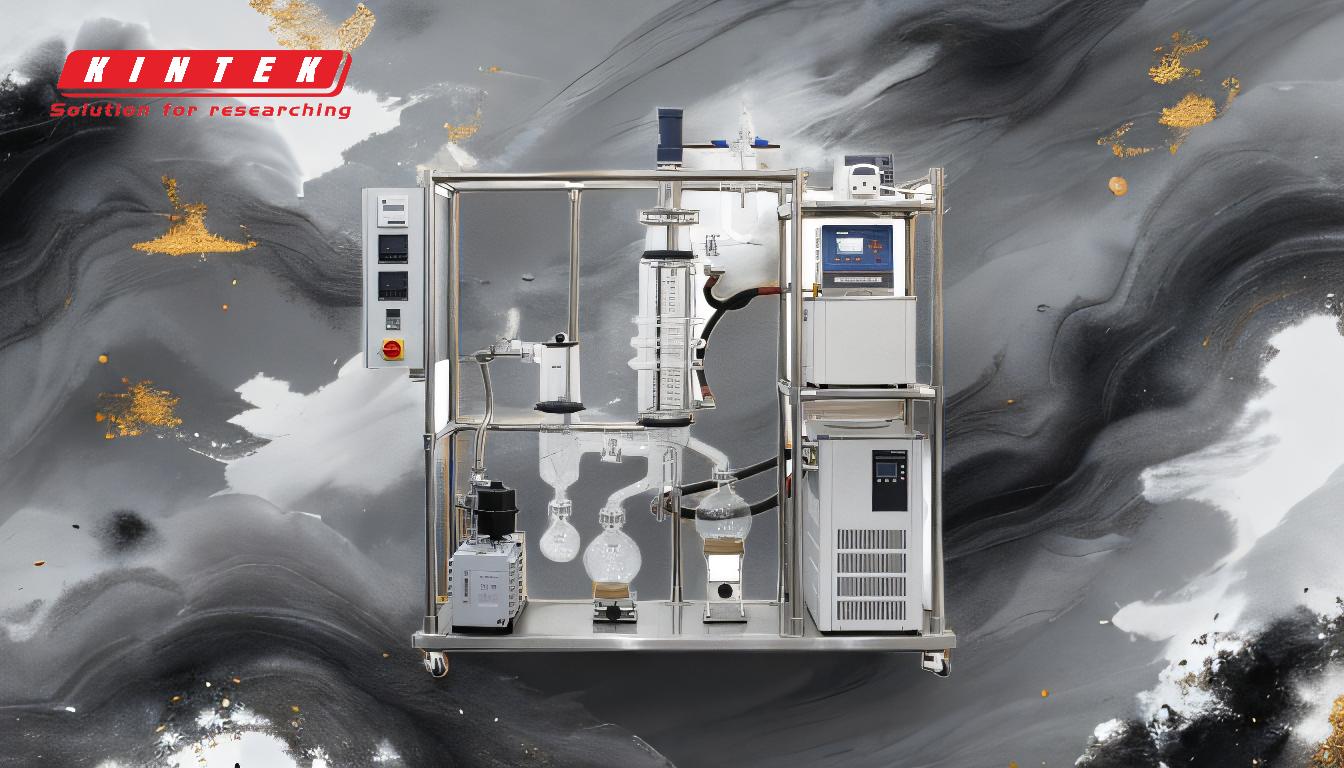Distillation under reduced pressure, also known as vacuum distillation, is a critical technique in chemistry and industrial processes. It involves lowering the pressure inside the distillation system, which reduces the boiling points of compounds. This method is particularly beneficial for heat-sensitive substances, as it allows distillation to occur at milder temperatures, preventing thermal decomposition. Additionally, vacuum distillation enhances separation efficiency, increases productivity, and ensures energy efficiency by optimizing evaporation rates. The process is widely used in applications such as molecular distillation, where it eliminates back-pressure and ensures precise separation based on molecular weight.
Key Points Explained:

-
Reduction of Boiling Points:
- Lowering the pressure in a distillation system reduces the boiling points of compounds. This is because boiling occurs when the vapor pressure of a liquid equals the external pressure. By reducing the external pressure, the liquid can boil at a lower temperature.
- This is particularly advantageous for heat-sensitive compounds that may decompose or degrade at higher temperatures. For example, many organic compounds, pharmaceuticals, and essential oils require gentle heating to preserve their integrity.
-
Prevention of Thermal Decomposition:
- Heat-sensitive substances can undergo unwanted chemical reactions, such as decomposition, polymerization, or oxidation, at elevated temperatures. Vacuum distillation minimizes this risk by allowing distillation to occur at lower temperatures.
- This ensures the purity and stability of the final product, which is crucial in industries like pharmaceuticals, where the integrity of active ingredients must be maintained.
-
Increased Productivity and Energy Efficiency:
- Distillation under reduced pressure allows for faster evaporation rates at lower temperatures. This increases the overall efficiency of the process, as less energy is required to achieve the desired separation.
- The wiping mechanism in some vacuum distillation systems further enhances evaporation efficiency, ensuring that energy is used optimally.
-
Enhanced Separation Efficiency:
- In molecular distillation, reducing pressure ensures that the boiling point is determined solely by the molecular weight of the substance, rather than its vapor pressure. This eliminates back-pressure, which can hinder separation.
- This precise control over the distillation process allows for the separation of compounds with similar boiling points, which would be difficult to achieve under normal atmospheric pressure.
-
Applications in Molecular Distillation:
- Molecular distillation is a specialized form of vacuum distillation used for high-purity separations. It is particularly useful for separating heat-sensitive compounds, such as vitamins, essential oils, and fatty acids.
- The absence of back-pressure in molecular distillation ensures that the process is highly efficient and capable of producing high-purity products.
-
Versatility in Industrial and Laboratory Settings:
- Vacuum distillation is widely used in both industrial and laboratory settings. In industrial applications, it is employed in the production of chemicals, pharmaceuticals, and food products.
- In laboratories, it is a common technique for purifying solvents, isolating natural products, and conducting research on heat-sensitive materials.
-
Environmental and Safety Benefits:
- By operating at lower temperatures, vacuum distillation reduces the risk of fire and explosion hazards associated with high-temperature processes.
- Additionally, it minimizes the release of volatile organic compounds (VOCs) into the environment, contributing to safer and more sustainable chemical processes.
In summary, distillation under reduced pressure is a vital technique that offers numerous advantages, including the ability to work with heat-sensitive substances, prevent thermal decomposition, and enhance separation efficiency. Its applications span a wide range of industries, making it an indispensable tool in both industrial and laboratory settings.
Summary Table:
| Key Benefits | Description |
|---|---|
| Reduction of Boiling Points | Lowers boiling points, ideal for heat-sensitive compounds. |
| Prevents Thermal Decomposition | Distills at milder temperatures, preserving product integrity. |
| Increased Productivity | Faster evaporation rates at lower temperatures. |
| Enhanced Separation Efficiency | Precise separation of compounds with similar boiling points. |
| Environmental & Safety Benefits | Reduces fire hazards and VOC emissions. |
| Versatility | Used in pharmaceuticals, food production, and lab research. |
Learn how vacuum distillation can optimize your processes—contact our experts today!











